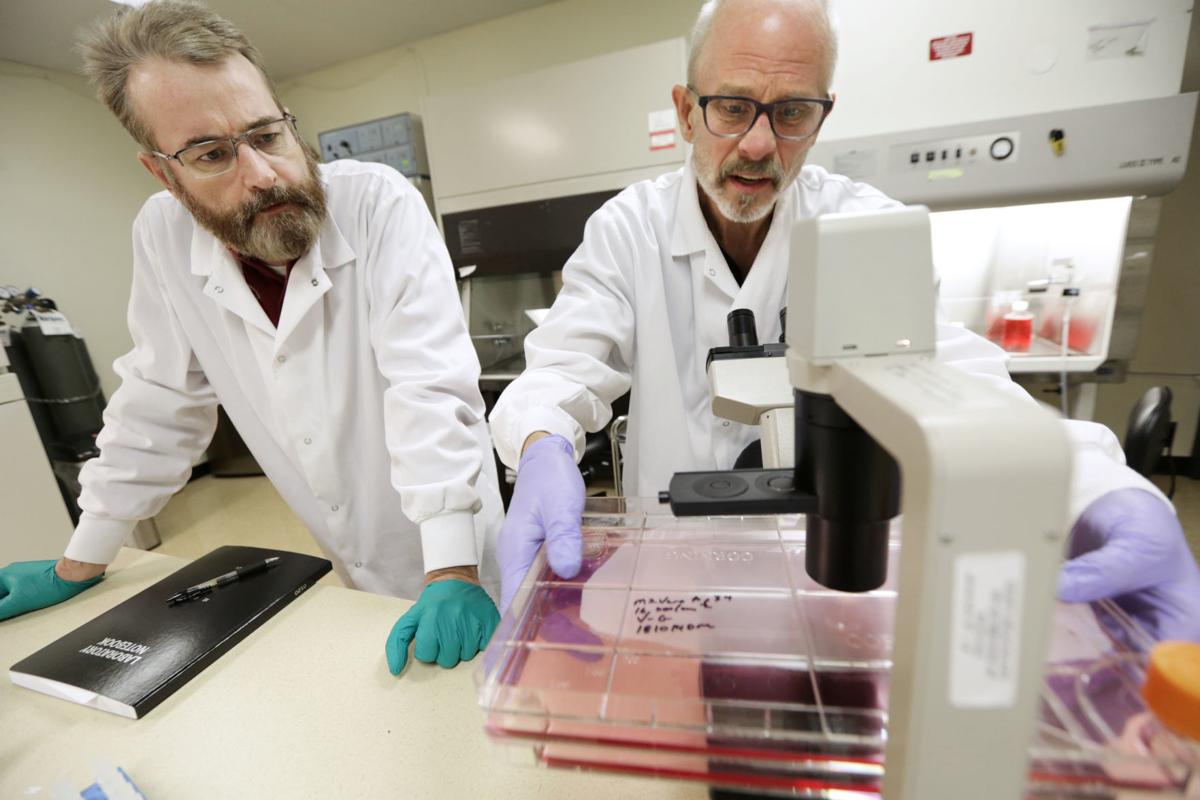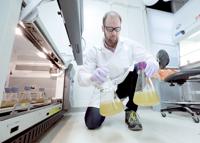David Marshall, left, research scientist, and Mike Moser, senior scientist, look at cells being grown for studies of an experimental flu vaccine at FluGen, on Madison’s West Side.
UW-Madison researchers and the vaccine companies FluGen and Bharat Biotech are developing and testing a vaccine against COVID-19 called CoroFlu, they announced Thursday.
CoroFlu will build on FluGen’s flu vaccine candidate known as M2SR. That vaccine, based on research by UW-Madison virologists and FluGen co-founders Yoshihiro Kawaoka and Gabriele Neumann, is a self-limiting version of the influenza virus that can induce an immune response against the flu.
Kawaoka’s lab plans to insert gene sequences from SARS-CoV-2, the official name of the new coronavirus that causes COVID-19, into M2SR so that the new vaccine will also induce immunity against the coronavirus, according to a UW-Madison statement.

Work on CoroFlu, including testing in laboratory animal models at UW-Madison, is expected to take three to six months. Bharat Biotech, based in Hyderabad, India, will then scale up production for safety and efficacy testing in humans.
CoroFlu could be in human clinical trials by this fall, the university said.
Four early-stage clinical trials, involving hundreds of subjects, have shown the M2SR flu vaccine to be safe and well tolerated, according to FluGen and the university. “This safety profile, M2SR’s ability to induce a strong immune response, and the ability of influenza viruses to carry sequences of other viruses make M2SR an attractive option for rapidly developing CoroFlu as a safe and effective SARS-CoV-2 vaccine,” the statement said.
M2SR is a unique form of the flu virus. It lacks a gene called M2, which restricts the virus to undergoing only a single round of replication in cells.

“The single replication means the virus can enter the cell, but it can’t leave,” says FluGen co-founder, president and CEO Paul Radspinner. “So, in essence it tricks the body into thinking it’s infected with flu, which triggers a full immune response. But since it can’t replicate further, you don’t get sick.”
CoroFlu, like M2SR, will be delivered intranasally. That mimics the natural route of infection by coronavirus and influenza and activates several modes of the immune system.
The Kawaoka group will insert genetic sequences from SARS-CoV-2 into M2SR and then assess CoroFlu’s safety and efficacy in animal models at UW-Madison’s Influenza Research Institute. The institute has a high-level biosafety facility designated Biosafety Level 3 Agriculture with the ability to safely handle and study pathogens like highly pathogenic influenza viruses and the novel coronavirus.
M2SR was developed by FluGen and includes technology exclusively licensed through the Wisconsin Alumni Research Foundation, which manages patents for UW-Madison.



Recent Comments